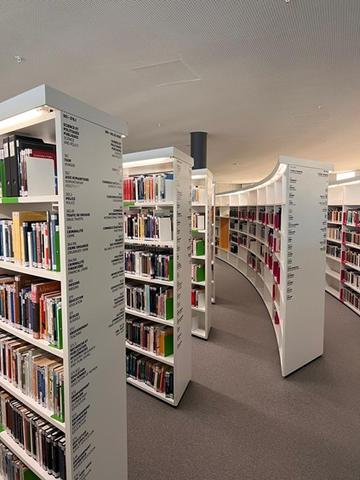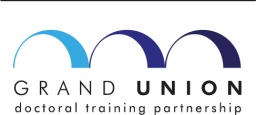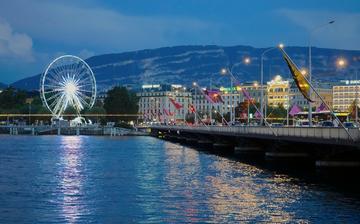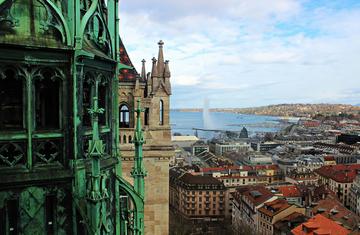Two Months at the Global Migration Centre of the Geneva Graduate Institute
University of Oxford | Migration Studies | 2023 Cohort

Geneva Graduate Institute’s Library. Photo by the Author.
Two Months at the Global Migration Centre of the Geneva Graduate Institute
I am a DPhil candidate in Migration Studies at the University of Oxford, affiliated with both the Centre on Migration, Policy and Society (COMPAS) and the Refugee Studies Centre. My research focuses on the politics of asylum and temporary protection, with particular attention to Venezuelan mobility and policy responses across South America, including Colombia, Peru, and Ecuador.
I recently had the opportunity to undertake an Overseas Institutional Visit (OIV) at the Geneva Graduate Institute, hosted by the Global Migration Centre under the guidance of Professor Vincent Chetail. This visit allowed me to advance my doctoral research at one of the leading centres for migration and refugee studies, while engaging closely with ongoing academic and legal debates and practical institutional work in the field.
The reasons for selecting my host institution
When I was exploring options for my OIV, I thought carefully about the methodological approach I wanted to develop in my doctoral research and the kinds of activities I hoped to pursue abroad. I was looking for a setting that could offer both rigorous academic supervision and the chance to advance the empirical and comparative dimensions of my project.
I chose to apply to the Geneva Graduate Institute because of its outstanding academic reputation and its focus on international law and public policy. I was especially drawn to the International Law Department, known for the breadth of issues it tackles, the expertise of its faculty, and its strong legal orientation. Its location in Geneva, a city at the heart of international organisations, offered the bonus of being able to immerse in both high-level scholarly debates and the practical realities of migration and international protection policy.
Within the Department, the Global Migration Centre stands out as a leading hub for research on human mobility. Its integration of legal, political, and social perspectives on migration made it an ideal environment for my research stay, allowing me to connect theory and practice in meaningful ways.
The Aims and Objectives of my OIV
My visit to the Geneva Graduate Institute was driven by four key objectives, each aimed at advancing different dimensions of my doctoral project. First, I focused on processing the data from the initial stage of my fieldwork. I also had the chance to work closely with my supervisor at the Institute, benefiting from in-depth discussions that provided fresh perspectives on my research. Beyond that, I immersed myself in the Institute’s academic environment, spending hours either at my desk or at the library, surrounded by books and reports on migration law and protection systems. Finally, I took every opportunity to meet and exchange ideas with fellow doctoral students and policymakers from Geneva-based institutions, enriching my understanding of both academic and practical approaches to migration and asylum.
Key OIV Activites
During my stay, I had the chance to exchange ideas with my host about the scope of my project and the role of comparative studies in shaping it. I also connected with several doctoral students from the Graduate Institute, which was a fantastic opportunity to share perspectives, compare approaches, and get constructive feedback on my own framework.
Beyond these academic exchanges, I was able to take part in activities that really enriched my research and built on the fieldwork I had completed a few months earlier. After planning ahead, I met with the UNHCR Liaison Officer for Latin America at UNHCR headquarters, and our discussion on temporary protection in the Americas gave me practical insights that directly shaped my analysis.
I also visited the International Organization for Migration (IOM), which offered a window into how migration programmes are implemented on the ground and how organisations navigate real-world challenges, including funding constraints. Another highlight was walking through the Palais des Nations, the heart of multilateral diplomacy, which provided a vivid backdrop to reflect on how international law and institutional practice intersect, a central dimension of my research.
Key Outcomes and Deliverables
One of the biggest achievements during my stay was making a solid start on transcribing and processing the data from the first stage of my fieldwork across Colombia, Peru, and Ecuador. It was incredibly rewarding to start seeing patterns emerge, drawing connections between the cases, and refining the structure of my empirical work.
Equally rewarding were the people I got to reconnect with, former colleagues from UNHCR and IOM, and friends at the ICRC, as well as the new professional relationships I built in Geneva. These connections were more than just networking: they offered fresh perspectives on the policy relevance of my research and reminded me how much collaboration and shared insight drive the field of migration studies.
The Benefits
The research visit at the university, and particularly in a city like Geneva, opened up invaluable opportunities to connect theory with practice, especially through engaging conversations with colleagues across different UN organisations. It also offered a chance to step back and reflect on my research, plan future publications, and develop academic pieces linked to my thesis.
Access to specialised resources on international law and migration allowed me to explore my fieldwork data from Colombia, Ecuador, and Peru in a fresh way, helping me spot patterns and refine my analytical approach. Working through the data in this new context was particularly rewarding, offering insights I hadn’t seen before and strengthening the comparative perspective of my research.
I hope that these Latin American insights will contribute to ongoing discussions at the Global Migration Centre, bringing often underrepresented regional perspectives and legal frameworks into broader debates on forced mobility and protection in the Global South.
Points of Advice or Caution for Other Students
During my stay at the Graduate Institute, I encountered some unexpected challenges that offered valuable lessons for planning a research visit. These obstacles weren’t too difficult to overcome, yet planning ahead while also being flexible made the whole experience much smoother:
- Plan for travel distances: If you’re not staying close to the Institute, be prepared for travel time and plan your workdays accordingly. Effective planning of your days can help you maximise the limited time of a short visit.
- Schedule meetings with your supervisor in advance: I recommend setting dates for meetings with your supervisor before travelling, if possible. This ensures you can make progress on key research objectives without delays.
- Arrange interviews with high-level officials / scholars early: If you plan to meet with representatives from international organisations, as I did with UNHCR, make sure to reach out well in advance. In my case, despite multiple attempts, I only received definitive answers halfway through my visit in Geneva. Early planning and persistent communication are essential to make the most of a short research stay.
- Allow some space for adjustment and unexpected delays, as these can be just as valuable as the activities you carefully plan in advance.
- Be flexible and patient: International academic environments often involve unpredictable schedules. Adapting to unexpected changes while keeping your research goals in mind is key to making the most of the experience.
GUDTP Funding Support for Overseas Institutional Visits




